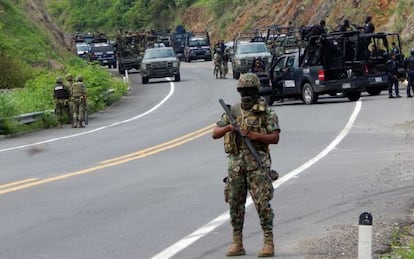Mexico's government on guard in the wake of violence in Michoacán
Seven clashes between police and suspected delinquents have left at least 26 dead and 15 injured

Michoacán is one of the most violent provinces in Mexico. Former president Felipe Calderón launched an offensive against drug trafficking in the region in December of 2006. Still, even by the province's standards, this week has been especially convulsive. There have been 7 clashes in the last three days and 20 in the last ten. At least 26 people have been killed and 15 others have been wounded.
The violence has not abated.
This Monday, an armed commando opened fire on a group of demonstrators in Los Reyes, 165 kilometers from Coalcomán. Five people died. The Mexican media reported the events in unsigned stories as is the custom in the most violent areas of the country. The next day, six more attacks. This week, one more attack. And this time it happened in Coalcomán (in the western part of the province) and left four police officers dead. Mexican President Enrique Peña Nieto held an emergency meeting this morning with his security team to assess the situation.
The ambushes, which appear to have been planned, occurred mainly in Tierra Caliente, in the western part of the state, in an area known for its significant drug production and the center for the operations of Los Caballeros Templarios cartel -the de facto heirs of La Familia Michoacana. Los Caballeros is a criminal organization founded around 2006 by Nazario Moreno known as El Más Loco, or The Craziest One. According to official reports Moreno was killed in a combined police and military raid in December of 2010.
Tierra Caliente holds the 19 municipalities that the federal government has identified as the "red zones" of the violence in Michoacán. In the last seven years the state has been witness to ambushes, assassinations of government officials at various levels, a hand grenade attack against civilians in September 2008, and in the last few months, the proliferation of armed self-defense neighborhood groups in areas where drug cartels wage turf wars.
The instability in Michoacán is also political. Its governor, Fausto Vallejo Figueroa (of the Institutional Revolutionary Party or PRI) has been on a leave of absence since April 2013 due to health issues. The acting governor, Jesús Reyna, insisted in an radio interview this afternoon that the roads in Michoacán are "passable" and that it is not "a failed state."
The seven attacks over the last three days come on the heels of 11 others that took place last week and the intermittent blockade of interstate highways by armed groups. Yesterday, for example, the bus terminal in Morelia, the state capital, had to cancel departures for several hours in the afternoon.
Reyna maintains that the clashes are a sign of a crackdown on delinquents. "Often we say they are bad news and that they speak ill of Michoacán. But for us, without going as far as to say that these are good news, they indicate efficiency," Reyna said this afternoon at a press conference in Morelia.
The government launched an ambitious security program in Michoacán in May which includes the deployment of large police and military forces. It has also made use of the "single command" strategy -a novelty in a country with more than 1000 police forces with different levels of authority. The authorities have said that they are confident that they will cut down the violence in the state in at least one month.
Translation: Dyane Jean François
Tu suscripción se está usando en otro dispositivo
¿Quieres añadir otro usuario a tu suscripción?
Si continúas leyendo en este dispositivo, no se podrá leer en el otro.
FlechaTu suscripción se está usando en otro dispositivo y solo puedes acceder a EL PAÍS desde un dispositivo a la vez.
Si quieres compartir tu cuenta, cambia tu suscripción a la modalidad Premium, así podrás añadir otro usuario. Cada uno accederá con su propia cuenta de email, lo que os permitirá personalizar vuestra experiencia en EL PAÍS.
¿Tienes una suscripción de empresa? Accede aquí para contratar más cuentas.
En el caso de no saber quién está usando tu cuenta, te recomendamos cambiar tu contraseña aquí.
Si decides continuar compartiendo tu cuenta, este mensaje se mostrará en tu dispositivo y en el de la otra persona que está usando tu cuenta de forma indefinida, afectando a tu experiencia de lectura. Puedes consultar aquí los términos y condiciones de la suscripción digital.








































